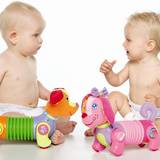Shop
01735
https://www.under5s.co.nz/shop/Hot+Topics+Articles/Child+Development/Do+you+have+a+gifted+child.html
Do you have a gifted child?
|
So how do you know if you have a gifted child? We take a look at some of the characteristics of gifted children, the meaning of giftedness, whether we should recognise gifted children and what to do if you feel you child is gifted.
|
You might also be interested in ...
The plus side of play dates
Are play dates really necessary when kids are young? We take a look at some of the benefits and developmental effects play dates can have on older babies, toddlers and pre-school kids when they catch up with their friends.
Why it's good for pre-schoolers to set goals
Goal setting for pre-schoolers is not something we hear about often, but it’s never too early to start. It’s a great way to build their self-confidence and a valuable life-long skill. Goal-setting helps them to identify what is wanted, and that if they set their minds to something, they can achieve it. Setting goals with your children will direct their efforts and encourage them to achieve success.
join usJoin us on social media for all our latest news. |
sign upSign up and receive our latest newsletters. |
|







We take a look at some of the characteristics of gifted children, the meaning of giftedness, whether we should recognise gifted children and what to do if you feel you child is gifted.
Do you have a gifted child?
Every parent wants their child to do well, so finding out your child is gifted should be a positive and rewarding experience.
However, being gifted often brings with it associated and unexpected challenges for a child, and their family and teachers to come to terms with.
What is giftedness?
Being gifted means that your child will be exceptional in one or more areas of interest compared to children of a similar age.
Children can be exceptional in areas such as music, art, languages, with numbers, science or even dance.
Your child’s gift may be in one area or in several. Special abilities may be inherited, but they are also developed by opportunities that are offered.
All socio-economic groups, cultures and ethnicities have children who are gifted. Cultures have a unique set of principles that place different value upon special abilities.
Characteristics of gifted children
If you feel your child could be gifted, here are some characteristics to look out for:
Should we recognise gifted children?
There is often debate about whether a child should be labelled ‘gifted’ or not.
Some people feel using the word ‘gifted’ is elitist and sets the child up for feeling superior to other kids, treated differently and not being able to fit in with their friends.
It is important to know and understand the abilities of each child in order to plan for their unique needs.
Should gifted children have special classes?
Whether or not gifted children should have special classes is something that’s up for discussion.
Often the feeling amongst parents is that money should be targeted at children who are under achieving, rather than those over achieving.
A common thought is that gifted children will achieve what is expected, so why give them more help?
However every child has the right to achieve his or her potential and we need to recognise that as gifted children they may have different learning needs. That could mean meeting their needs through extra classes or even a teacher aide.
What to do if you feel your child is gifted
Regardless of whether or not your child is gifted they should be given plenty of opportunities to have their abilities recognised, valued, and developed, to be able to grow into the person they should be.
More kids articles to enjoy:
Source: This article has been written by Creators, a nationwide service offering quality home-based care and education. Creators are passionate about seeing every child’s unique talent being recognized and nurtured.
Image source: happychild